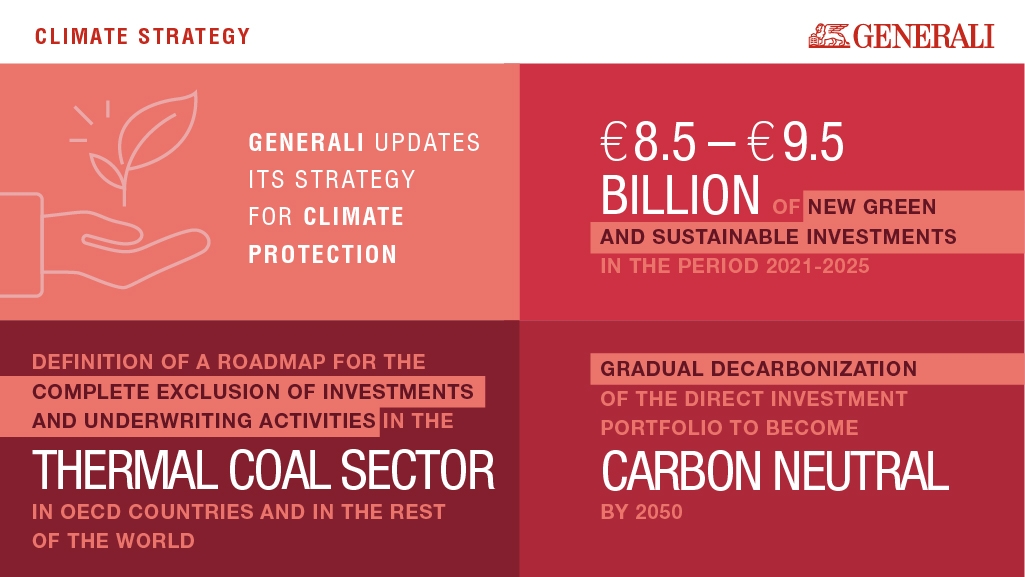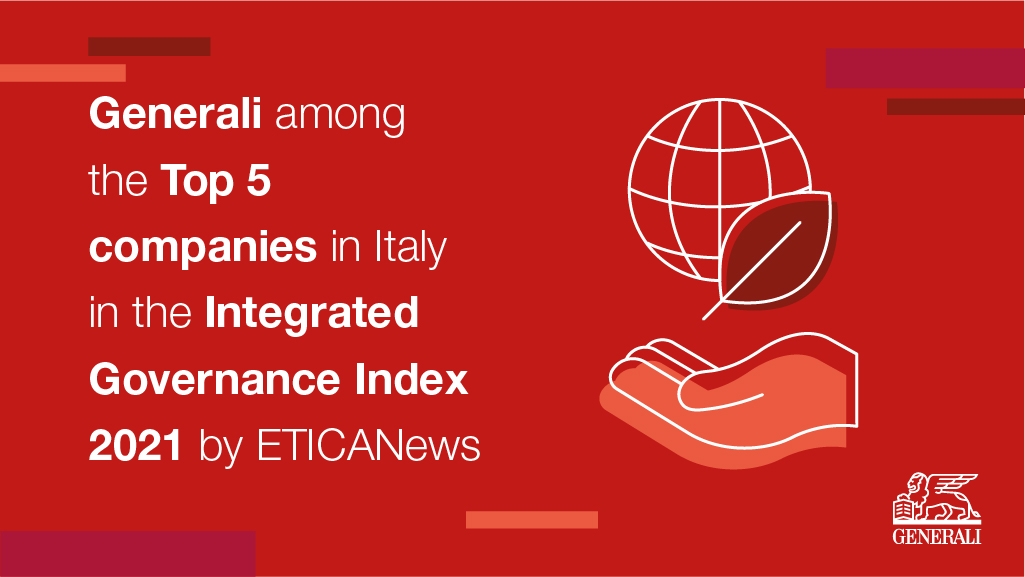Generali updates strategy for climate protection
 |
| Generali Group’s new strategy on climate change pledges significant action related to investment and underwriting activities, committing to a low climate impact future |
The strategy, which updates and extends the group’s existing plan approved in February 2018, pledges significant action related to investment and underwriting activities, the group's core businesses, gearing toward a low climate impact future.
As for direct investment, the group has set €8.5-9.5 billion ($10.07-11.26 billion) of new green and sustainable investments between 2021 and 2025. This is in line with the previous target of €4.5 billion ($5.3 billion) between 2019 and 2021, which was surpassed a year in advance and stood at €6 billion ($7.1 billion) at year-end 2020.
 |
| Generali has been confirmed in the top five of the most sustainable companies and first in the financial sector in the sixth edition of the Integrated Governance Index by ETicaNews |
It also aims increasingly restrictive exclusion criteria for the coal sector, towards a gradual but complete disposal of investments in these activities. The new strategy aims to fully phase out issuers which operate in the thermal coal sector in OECD countries by 2030 and 2040 in the rest of the world.
Other priority target is the gradual decarbonisation of the direct investment portfolio to reach carbon neutrality by 2050. This is consistent with the Paris Agreement’s goal to limit global warming to 1.5 degrees Celsius above preindustrial levels and with the commitment undertaken as part of the Net-Zero Asset Owner Alliance.
 |
| Generali Vietnam is committed to contributing to the sustainable development of the economy and protecting the environment |
As a 2025 intermediate target, Generali will decrease carbon emissions for the corporate portfolio (corporate bonds, listed equity) by 25 per cent and will align the real estate portfolio to the 1.5 degree Celsius pathway.
“The new ambitious targets for climate strategy are in line with our commitment and convictions in this specific area and leveraging on the results already achieved,” said Generali Group CEO Philippe Donnet. “In particular, the €6 billion ($7.1 billion) of new green and sustainable investments made over the last three years have allowed us to exceed our pre-set targets ahead of schedule. We believe that the private sector can play a key role in financially supporting the 'Just Transition' for a future with net-zero greenhouse gas emissions by assisting public institutions in taking the necessary actions.”
In respect to underwriting, new goals include reduction of the minimal current exposure to the thermal coal sector, in order to reach zero exposure by 2030 in OECD countries and 2038 in the rest of the world.
 |
| Contributing to sustainable development in the society is one of the top priorities of Generali Group globally and in Vietnam, with practical, innovative, impactful and sustainable community initiatives such as the parenting education programme "Sinh Con, Sinh Cha" |
Forging ahead with the commitment to no longer insure upstream oil and gas activities, this includes the commitment to no longer underwrite risks associated with the exploration and production of fossil fuels from tar sands, from shale deposits (oil and gas) or extracted in the Arctic zone, both onshore and offshore.
| Generali Group has set a clear roadmap for the complete exclusion of investments and underwriting activities in the thermal coal sector in OECD countries and in the rest of the world. |
Generali is also committed to engaging stakeholders in creating a net-zero emissions future. For this reason, Generali will engage at least 20 carbon-intensive investees in the group’s investment portfolio by 2025 to drive real-world impact.
Following the ambition to be climate negative in 2040 with the intermediate goal of achieving climate neutrality by 2023, Generali Group aims to purchase power absolutely from renewable sources wherever possible and show further commitment to efficiently invest in energy efficiency.
It also engages a science-based reduction of the greenhouse gas emissions related to offices, data centres, and company car fleet by at least 25 per cent against the 2019 baseline.
What the stars mean:
★ Poor ★ ★ Promising ★★★ Good ★★★★ Very good ★★★★★ Exceptional
Related Contents
Latest News
More News
- Trung Nam-Sideros River consortium wins bid for LNG venture (January 30, 2026 | 11:16)
- Vietnam moves towards market-based fuel management with E10 rollout (January 30, 2026 | 11:10)
- Envision Energy, REE Group partner on 128MW wind projects (January 30, 2026 | 10:58)
- Vingroup consults on carbon credits for electric vehicle charging network (January 28, 2026 | 11:04)
- Bac Ai Pumped Storage Hydropower Plant to enter peak construction phase (January 27, 2026 | 08:00)
- ASEAN could scale up sustainable aviation fuel by 2050 (January 24, 2026 | 10:19)
- 64,000 hectares of sea allocated for offshore wind surveys (January 22, 2026 | 20:23)
- EVN secures financing for Quang Trach II LNG power plant (January 17, 2026 | 15:55)
- PC1 teams up with DENZAI on regional wind projects (January 16, 2026 | 21:18)
- Innovation and ESG practices drive green transition in the digital era (January 16, 2026 | 16:51)

 Tag:
Tag:


























 Mobile Version
Mobile Version